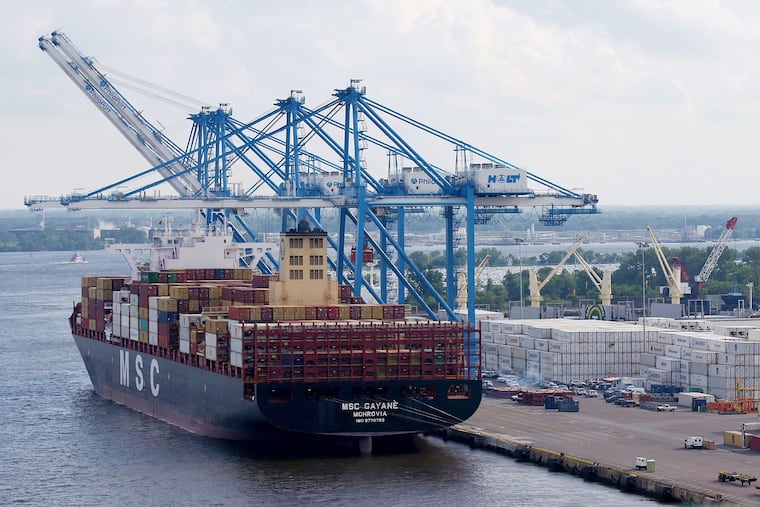Crew mate aboard 20-ton cocaine cargo ship admits role in record $1 billion Philly port drug bust
The guilty plea from Aleksandar Kavaja, of Montenegro, is the latest sign of progress in an ongoing investigation that has stretched from southern Europe and South America to the Port of Philadelphia.

A ship’s electrician from Montenegro became the third member of an international cargo vessel’s crew to admit playing a role in the smuggling of a record-breaking 20-ton cocaine haul seized by federal authorities at the Port of Philadelphia last year.
Aleksandar Kavaja, 27, pleaded guilty to narcotics conspiracy charges Thursday and told a federal judge he and three other crew mates aboard the MSC Gayane were recruited by drug smugglers in their native country before the ship set out on its journey.
His guilty plea is the latest sign of progress in an international investigation into one of the largest cocaine busts in U.S. history. Since the June 17, 2019, discovery, the probe has spanned from the Packer Avenue Marine Terminal in South Philadelphia to southern Europe and South and Central America.
But after announcing the record haul at a splashy news conference where law enforcement officials posed for photos next to stacks of cocaine worth an estimated $1 billion, the investigation has largely proceeded out of public view..
At least seven of the Gayane’s crew of roughly 20 were arrested at the time, though most of the court filings in their cases remain under court seal. And families of the men, from Montenegro and Samoa, have reported difficulty finding out what has happened to their loved ones since they were booked into the Federal Detention Center in Philadelphia over a year ago.
Appearing in a public court hearing for the first time since his arrest last year, Kavaja responded Thursday to a series of routine questions from U.S. District Judge Harvey Bartle III in clipped, accented English.
He described signing on with the Switzerland-based shipping conglomerate Mediterranean Shipping Co. (MSC) soon after leaving high school and working on other six-month, long-haul voyages before his trip on the MSC Gayane.
Though Kavaja admitted he’d been recruited while still in the Balkans to help smuggle the drugs aboard, neither he nor the court documents shed any light Thursday on who was ultimately behind the shipment.
His attorney, Andres Jalon, declined to discuss the specifics of how his client had become involved in the smuggling effort, citing fear of retribution against his client and his family in Montenegro.
Still, he said, the drug smugglers who recruited Kavaja in the Balkan nation put him in a tough spot.
“They knew he was going to be on this boat [and] he was approached to do this,” Jalon said. “If he says yes, he has to be out there on the ocean with them for six months and do what they say. If he says no, he’s still going to be out there on the boat with them. They’d throw him over the side. Where’s he going to go?”
His plea agreement did not include requirements that he cooperate with the ongoing probe.
Other crew members have said they were paid at least 50,000 euros (roughly $55,000) to join in the smuggling effort, according to sealed court filings from last year obtained by The Inquirer.
They used burner phones to communicate with drug suppliers in South America and coordinated the loading of the drugs from speedboats that approached the cargo vessel several times under cover of night.
The central group of four crewmen recruited in Montenegro also persuaded other members of the crew mid-journey to help them load and conceal the drugs, Kavaja admitted Thursday. Using the ship’s crane, they pulled duffel bags filled with wrapped cocaine off the smaller boats and onto the Gayane’s deck before splitting the individual bricks among seven cargo containers carrying wine, vegetable extract, Chilean dried nuts, scrap metal, and other legitimate goods bound for Europe, Africa, and Asia.
Ultimately, authorities have said, the drugs were bound for Rotterdam, Netherlands, but were intercepted in Philadelphia. U.S. customs officials spent nearly a week in June 2019 searching the ship after detecting the Gayane’s illicit cargo.
Since the seizure, two other crewmen — Nenad Ilic, 40, and Vladimir Penda, 27, both of Montenegro — have also pleaded guilty to drug smuggling conspiracy charges.
The other previously arrested crewmen include Ivan Durasevic, 30, and Bosko Markovic, 38, both of Montenegro, as well as Samoans Fonofaavae Tiasaga, 29, and Laauli Pulu, 34. All seven remain in custody at the Federal Detention Center in Center City.
Kavaja, Penda, and Ilic face a mandatory minimum sentence of 10 years in prison.